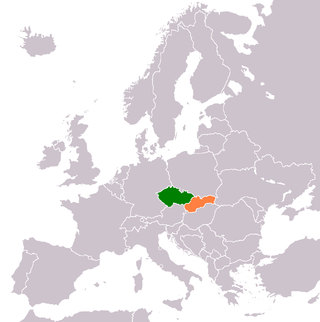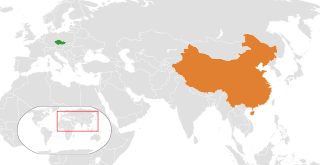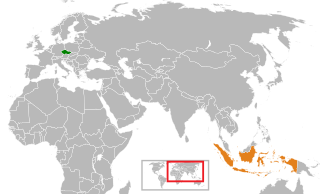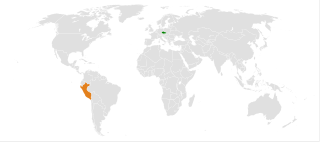 | |
Czech Republic | Japan |
|---|---|

Bilateral relations between the Czech Republic and Japan were established in 1919 by Czechoslovakia and Japan.
 | |
Czech Republic | Japan |
|---|---|

Bilateral relations between the Czech Republic and Japan were established in 1919 by Czechoslovakia and Japan.

The diplomatic relation between Czechoslovakia and Japan was established in 1919. [1] Czech architect Antonin Raymond was the honorary consul for the First Czechoslovak Republic in Japan from 1926 until 1939, representing the government of T. G. Masaryk. [2] The relations were broken off during World War II from 1939, and re-established in 1957. [3] Japan's first Minister Plenipotentiary to Czechoslovakia was Harukazu Nagaoka. [4]
After the Dissolution of Czechoslovakia in 1993, Japan recognized the foundation of the Czech Republic and the Slovak Republic, and likewise continued diplomatic relations with both republics.
In July 2002 the Emperor and Empress of Japan, Akihito and Michiko, made an official visit to Prague. [5]
In August 2003, Japanese Prime Minister Junichiro Koizumi paid an official visit to the Central Europe, namely Germany, Poland and the Czech Republic. On August 20, he left Warsaw for Prague as the last destination of his journey. In the afternoon of the next day, he held talks with Czech Prime Minister Vladimír Špidla at the Prime Minister's Office and there they exchanged their ideas and thoughts on the bilateral relations and significant global issues that include the nuclear ambitions of North Korea and reconstruction of Iraq, where it had been only three months since the war had ended. [6] According to the meeting, both of the prime ministers issued the "Joint Statement towards Strategic Partnership between Japan and the Czech Republic," which celebrated 10th anniversary of their partnership and the imperial visit to Prague a year ago as an epoch-making event and proclaimed more evolution of cooperation in the bilateral relations, in assisting the renaissance of Iraq and in preventing the further proliferation of weapons of mass destruction. [7]

Economic relations between Japan and the Czech Republic have been developing steadily with rapid growth of large-scale direct investment and trade of electrical machinery and mechanical components. [1]
In the year of 1968, when self-proclaimed "brotherhood nations" the Soviet Union and four communist states sent tanks to Prague, Japan sent a private enterprise there; that is to say, one of the largest Japanese general trading companies Mitsui & Co. started operating in the capital of the Czech Republic. [8] A few years later the end of the Cold War, in 1993, Japan External Trade Organization, which was authorized as a government-related organization to promote Japanese export, import and investment, newly established their office in Prague. [9] Thereafter, two of major Japanese manufacturers found their facilities, namely a television factory of Matsushita in Plzeň in 1996 and a polyester fabric factory of Toray in Prostějov in 1997. [8]
As the most important milestone in Czech–Japanese business history, Toyota Peugeot Citroën Automobile, a private joint venture between Toyota and Peugeot Citroën, established the headquarters and auto-factory in Kolín in 2002. [10] Its manufacturing started in February 2005, and as of March 2012, TPCA had produced more than 2 million vehicles since the initial production. [11]
In Czech Republic, there are three universities that implemented Japanese studies courses; Charles University in Prague, [12] Masaryk University in Brno [13] and Palacky University in Olomouc. [14]



The Czech Republic is a Central European country, a member of the European Union, the Organisation for Economic Co-operation and Development (OECD), Organization for Security and Co-operation in Europe (OSCE), the North Atlantic Treaty Organization (NATO), the United Nations. It entertains diplomatic relations with 191 countries of the world, around half of which maintain a resident embassy in the Czech capital city, Prague.

Relations between the Czech Republic and the United States were officially established in 1918, but has been cut throughout the history, exactly between 1948-1989 when the Czech Republic was under the soviet influence.

Czech Republic–Mongolia relations refer to the diplomatic relations between the Czech Republic and Mongolia. The Czech Republic has an embassy in Ulaanbaatar. Both nations are full members of the World Trade Organization and United Nations.

Czech Republic–Russia relations are the bilateral foreign relations between the Czech Republic and the Russian Federation. Relations have substantially deteriorated in recent years due to events such as the Russian annexation of Crimea in 2014, Russian sabotage of Czech ammunition depot in Vrbětice in 2014, poisoning of Sergei Skripal in 2018 and Russian invasion of Ukraine in 2022.

Czech Republic–United Kingdom relations are foreign relations between the Czech Republic and the United Kingdom. The Czech Republic has an embassy in London and four honorary consulates. The United Kingdom has an embassy in Prague.

The Czech Republic and Slovakia established diplomatic relations on January 1, 1993. The Czech Republic has an embassy in Bratislava. Slovakia has an embassy in Prague. Both countries are full members of the European Union and of NATO.

Colombian–Czech relations are foreign relations between Colombia and the Czech Republic. Colombia is represented in the Czech Republic through its embassy in Vienna (Austria). The Czech Republic has an embassy in Bogotá and 3 honorary consulates.

Relations between Israel and the Czech Republic, and its predecessor state Czechoslovakia, have varied widely over time.

The nations of the Czech Republic and Mexico established diplomatic relations in 1993. Relations between both nations existed beginning in 1922 when the Czech Republic was part of Czechoslovakia until its separation from the union in 1992.

Denmark–Japan relations are foreign relations between Denmark and Japan. Denmark has an embassy in Tokyo, and Japan has an embassy in Copenhagen. There are 500 Danes who live in Tokyo.

China–Czech Republic relations or Sino–Czech relations are international relations between China and the Czech Republic. There were official relations by 1919 and formally established relations followed on 6 October 1949 between Czechoslovakia and China. In 1993, the Czech Republic was established and inherited the Czechoslovak treaty. The relations, trade and tourism between the China and the Czech Republic improved rapidly since the 1990s; and in the 2010s, agreements were made for more thorough economic improvements. Relations have deteriorated since 2018 due to major Czech politicians visiting Taiwan.

Czech Republic–Pakistan relations are bilateral relations between the Czech Republic and Pakistan. Czech diplomatic relations with Pakistan were formally established on 27 September 1950 by Czechoslovakia and re-established by the Czech Republic in 1991. Pakistan has an embassy in Prague and the Czech Republic has an embassy in Islamabad.

The Czech Republic and the Republic of Indonesia established diplomatic relations in 1950. Both nations have agreed to forge ties to deepen relations, especially in the business and trade sector. Indonesia has an embassy in Prague, while the Czech Republic has an embassy in Jakarta that is also accredited to Brunei, Timor Leste and ASEAN.

Economic relations between India and Czech Republic date back to the Middle Ages. People in both countries have always been interested in learning more about the history, language and culture of the other country. During the years after India's independence, Czechoslovakia also played a role as a vital economic partner. Today, both India and Czech Republic have established close relations when it comes to trade, investment and tourism.

Chile–Japan relations are the bilateral relations between Chile and Japan. Both nations are members of the Asia-Pacific Economic Cooperation, Comprehensive and Progressive Agreement for Trans-Pacific Partnership, Forum of East Asia–Latin America Cooperation and the Organisation for Economic Co-operation and Development.

Brazil–Czech Republic relations are the diplomatic relations between the Federative Republic of Brazil and the Czech Republic. Both nations enjoy friendly relations, the importance of which centers on the history of Czech migration to Brazil. Approximately 500 thousand Brazilians have Czech ancestry. Both nations are members of the United Nations.

Czech Republic–Spain relations are the bilateral and diplomatic relations between these two countries. Relationships are mainly defined by the membership of both countries to the European Union and NATO. The Czech Republic has an embassy in Madrid and consulates in Barcelona, Benidorm, Bilbao, Oviedo, Palma de Mallorca and Santa Cruz de Tenerife. Spain has an embassy in Prague, as well as an Education Attaché, a Commercial Office and an Instituto Cervantes; the Delegation of Spanish Tourism for this country operates from Vienna.

Relations between Czechoslovakia and the United States refer to two periods in Czechoslovakia's history. The first being the establishment of Czechoslovakia after its declaration of independence in 1918 from Austria-Hungary initiated by President Woodrow Wilson as part of his Fourteen Points following World War I. The second period being the communist era from 1948 when relations were strained, until 1992 when Czechoslovakia split forming the independent nations of the Czech Republic and Slovakia as a result of the 1989 Velvet Revolution.

Czech Republic–Peru relations are the bilateral relations between the Czech Republic and Peru. Both countries are members of the United Nations.